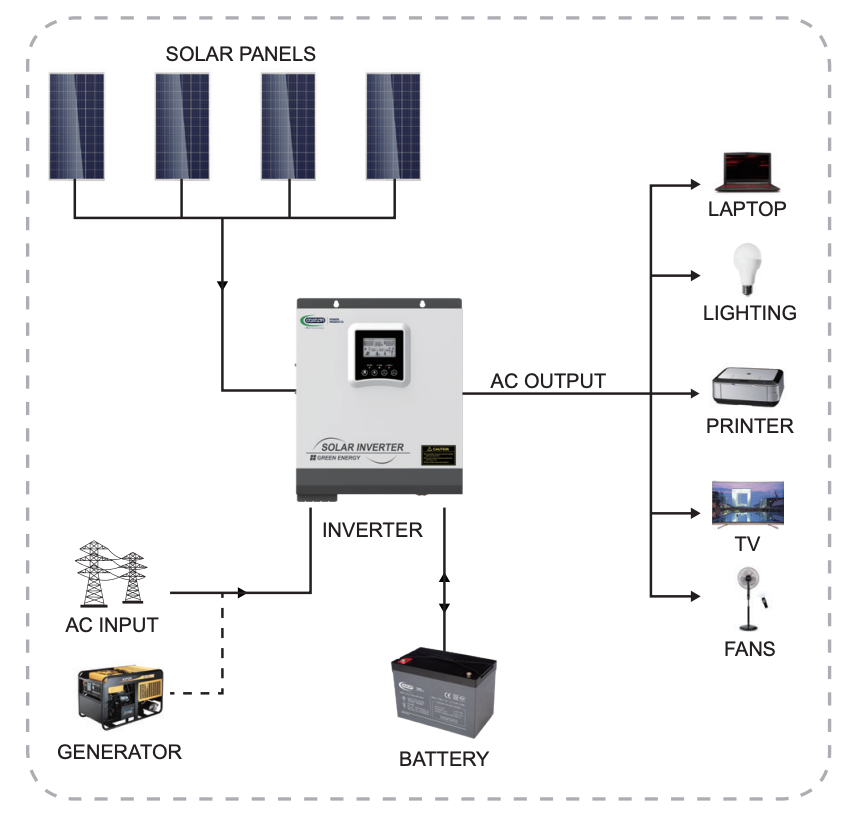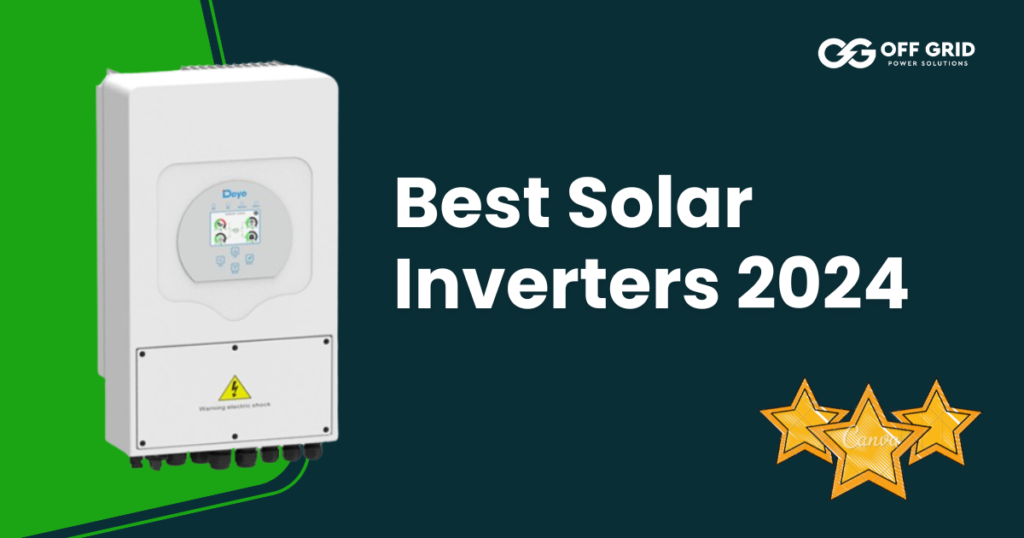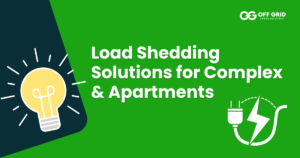
As South Africa continues to embrace renewable energy, the demand for efficient and reliable solar power solutions has skyrocketed.
At the heart of every successful solar installation lies a crucial component: the solar inverter. The choice of the best solar inverter plays a vital role in maximizing energy conversion, ensuring optimal performance, and achieving long-term cost-effectiveness.
In this blog, we delve into the world of the best solar inverters, exploring the top brands available from Off Grid Power Solutions, their features, and their performance in the South African market.
Whether you are a homeowner, business owner, or industry professional, this guide aims to help you make informed decisions when it comes to selecting the best solar inverter for your specific needs, taking into account factors such as efficiency, reliability, affordability, and compatibility with South Africa’s unique conditions and grid requirements.
Join us on this journey as we empower you with knowledge and insights into the best solar inverters available in South Africa, enabling you to harness the power of the sun for a greener and more sustainable future.

The 3 types of solar inverters:
Grid-tied Solar Inverters
Grid-tied Solar Inverters operate in conjunction with the electrical grid, where solar power is consumed first. In this setup, affordable inverters may not have the capability to export excess electricity to the grid and may require an active grid connection for operation.
Off-Grid Solar Inverters
Off-grid solar inverter systems, on the other hand, are designed to function independently of the grid, relying solely on solar power or stored energy from batteries. However, these systems can still be connected to the grid and will switch over to grid power if solar or battery capacity is insufficient. It is important to note that electricity generated by off-grid systems cannot be fed back into the grid.
Hybrid Solar Inverters
Hybrid solar inverter systems offer versatility by allowing both grid-tied and off-grid configurations. These systems incorporate an inverter capable of utilizing a combination of solar power and grid electricity based on demand and availability. This flexibility ensures optimal utilization of available energy sources as required, thus making hybrid inverters the best solar inverter option.
But Wait! Do I really need a solar inverter?
If you’re considering harnessing solar power for your home or business, choosing the best solar inverter is an essential component of your solar energy system. Solar panels generate direct current (DC) electricity, which cannot be directly used to power your appliances or be fed into the electrical grid.
A solar inverter is responsible for converting that DC electricity into alternating current (AC), which is a usable form of electricity for your everyday needs.
Without a solar inverter, the energy generated by your solar panels would go to waste. The solar inverter ensures that the electricity produced is compatible with your electrical system, allowing you to power your home or business with clean and sustainable solar energy.

If you are looking for a solar panel that is compatible with the inverters mentioned in this post you can view a few that we currently have for sale: Click here to view our solar panels
Where should a Solar Inverter be located?
Almost all solar inverters are installed safely outside and are fully weather-rated. Solar inverters should, however, be installed in a protected or shaded area to prevent extreme South African weather and wide temperature variations, which can lower performance and lifespan.
Locating a solar inverter inside a garage, under a carport, and out of direct sunlight will significantly extend its lifespan. Most importantly, locations exposed to the hot afternoon sun should always be avoided.
If exposure to direct sunlight is unavoidable, a protective sun cover will help the inverter last longer.
The best battery configuration for your solar inverter.
When choosing the best solar inverter, it is essential to get the setup and configuration of your off-grid power system correct. Here is what we recommend for your setup and inverter type.
| Inverter & Battery Setup Recommendation | |
|---|---|
| 12v Inverter | Use a minimum of one 12v battery or 2 but in a parallel connection. ( 100a/h or 200a/h 12v) |
| 24v Inverter | Use 2x 12v Batteries to make up 24v in Series. ( 2x 12v 100a/h ) |
| 48v Inverter | Use either 4x 12v 100a/h or 2x 200amp/hour 12v batteries in series. Or 1x 100a/h Lithium 48v battery. |
Here are our picks on the best solar inverters in South Africa
1,3 & 5 kW Goscor Inverters1kW Hybrid Goscor Inverter3kW Hybrid Goscor Inverter5kW Hybrid Goscor Inverter | |
Rebel Max Hybrid Inverters5kW Rebel Max Hybrid Inverter | |
Phocos Hybrid Inverter5kW Phocos Inverter8kW Phocos Inverter | |
Deye Hybrid Inverter5kW Deye Inverter8kW Deye Inverter | |
SRNE All-In-One Inverter + BatterySRNE 5kW Inverter with Battery |
Choosing the best solar inverter: High vs Low Frequency
High-frequency solar inverters
High-frequency solar inverters, also known as lightweight or compact inverters, are designed to be smaller and more lightweight than their low-frequency counterparts.
These inverters operate at higher switching frequencies, resulting in increased efficiency and reduced size. They are typically less expensive and offer improved energy conversion efficiency, making them a popular choice for residential and small-scale solar installations.
However, high-frequency inverters may have lower surge power capabilities, limiting their suitability for high-demand appliances or systems.
low-frequency solar inverters
On the other hand, low-frequency solar inverters, also called heavy-duty or traditional inverters, operate at lower switching frequencies.
They are larger and heavier compared to high-frequency inverters but offer robust performance and higher surge power capabilities.
Low-frequency inverters are often preferred for larger-scale solar installations, off-grid systems, or applications with high power demands, such as industrial or commercial setups.
They can handle larger loads and are generally more durable and reliable, although they may be relatively more expensive.
Ultimately, the choice between high-frequency and low-frequency solar inverters depends on factors such as the size of the installation, power requirements, budget, and specific needs of the system.
It is advisable to consult with a professional solar installer or engineer to determine the best solar inverter type for your solar energy project.
Hybrid off-grid vs hybrid on-grid
The choice between hybrid off-grid and hybrid on-grid systems depends on various factors. Hybrid off-grid systems are suitable for locations without reliable grid access, offering energy independence but requiring careful management.
Hybrid on-grid systems are preferable for areas with reliable grid access, providing the flexibility to utilize solar power, reduce grid dependency, and potentially benefit from net metering.
It is important to assess your specific energy needs, location, and available resources to determine which hybrid solar system configuration aligns best with your requirements. Consulting with a professional solar installer or engineer can provide valuable insights and guidance in selecting the best solar inverter for your requirements.
Conclusion: The best solar inverter?
In conclusion, when comparing the best solar inverters, considerations must be made regarding the system configuration, whether it’s hybrid off-grid versus hybrid on-grid and the choice between high-frequency and low-frequency inverters.
For those seeking energy self-sufficiency in remote locations or areas with unreliable grid access, hybrid off-grid systems offer independence through solar panels, batteries, and a hybrid solar inverter. These systems provide autonomy and require careful monitoring and management.
Alternatively, hybrid on-grid systems are connected to the electrical grid while incorporating solar panels, batteries, and a hybrid solar inverter. They offer the flexibility to utilize solar power, grid power, and battery power, potentially reducing grid dependency and even benefiting from net metering.
Furthermore, when considering the inverter type, high-frequency inverters are compact, cost-effective, and efficient, making them suitable for residential or small-scale installations. In contrast, low-frequency inverters are more robust and capable of handling larger loads, making them preferable for larger-scale projects or applications with higher power demands.
Ultimately, the choice of the best solar inverter depends on individual needs, available resources, and system requirements. It is advisable to consult with a professional solar installer or engineer to assess specific circumstances and make an informed decision that ensures optimal performance and long-term reliability.
By carefully evaluating the system configuration and selecting the appropriate inverter type, one can maximize the benefits of solar energy, whether it be achieving energy independence, reducing reliance on the grid, or maximizing efficiency and power capacity. Embracing solar power with the best solar inverter is a step towards a greener, more sustainable future.
Frequently Asked Questions
What size inverter is needed to run a house?
The size of the best solar inverter needed to run a house depends on the specific power requirements, typically ranging from 3 kW to 10 kW or higher. Most households make use of a 5 KW inverter.
How many solar panels will you need for 5kW inverter?
To create a 5kW solar system, you would require 12 solar panels, assuming the panels have a capacity of 415W each. This configuration would provide an overall output of approximately 4.98kW. Each panel would have dimensions of around 1.8 meters by 1.1 meters, resulting in a total required roof space of at least 23.7m².
Latest Posts







